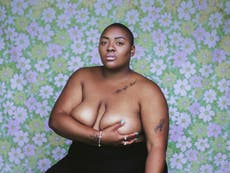The Independent's journalism is supported by our readers. When you purchase through links on our site, we may earn commission.
Stephanie Yeboah interview: ‘Reclaiming the word fat has taken away ammunition from trolls’
The author and body positivity influencer speaks to Sabrina Barr about the censorship of plus-size, black women on social media and the importance of encouraging self-love from a young age


Your support helps us to tell the story
From reproductive rights to climate change to Big Tech, The Independent is on the ground when the story is developing. Whether it's investigating the financials of Elon Musk's pro-Trump PAC or producing our latest documentary, 'The A Word', which shines a light on the American women fighting for reproductive rights, we know how important it is to parse out the facts from the messaging.
At such a critical moment in US history, we need reporters on the ground. Your donation allows us to keep sending journalists to speak to both sides of the story.
The Independent is trusted by Americans across the entire political spectrum. And unlike many other quality news outlets, we choose not to lock Americans out of our reporting and analysis with paywalls. We believe quality journalism should be available to everyone, paid for by those who can afford it.
Your support makes all the difference.“Some people tend to flinch whenever I call myself fat because they automatically assume that I’m insulting myself,” Stephanie Yeboah tells me over the phone. “But you can be fat and you can be beautiful as well. You can be stunning.”
Yeboah is a body positivity influencer and author of the recently published Fattily Ever After: A Fat, Black Girl's Guide to Living Life Unapologetically. With 180k Instagram followers and 48k on Twitter, Yeboah is a vocal proponent of body positivity and the importance of eradicating the negative connotations associated with the word “fat”.
But it took Yeboah a long time to get to this place. From the age of 11 until she was 23, the influencer describes having had a “a very terrible relationship” with her body. “I suffered from a lot of self-hate and wanting to be slimmer in order to be seen as pretty and desirable,” she explains.
Yeboah attributes her negative self worth to the lack of positive black female role models in the media and popular culture. She recalls turning on the TV and coming across women that looked like her “being portrayed as slaves, as servants, as the help and as the sassy best friend”, as opposed to “fully fledged characters that had their own amazing character arcs or were successful”.
The picture was no better for plus size women, she says. “A lot of people look at plus-sized women and assume us to be a monolith. They assume that we all behave the same way and that we are all unhappy with ourselves and unhealthy and unlucky in love, because of what they see on TV.”
“I was really tired of seeing plus-sized women always being unlucky in love, or portrayed as idiotic or stupid or pathetic or lazy or being very insecure about how they looked and their weight, and I thought it was about time for me to have these conversations online surrounding representation and how we are portrayed.”
When I was younger, I bleached my skin because I was so ashamed of being a darker skinned black girl
It was the discovery of the body positive movement that changed things for the 31-year-old. “I started seeing images of women that looked like me celebrating their bodies, it almost triggered something in me to say, ‘I’ve spent all of this time dieting and having negative self-talk – who am I doing it for? Because I’m not doing it for me.’ I was doing it for other people’s approval.”
One influencer in particular, TatiAna Mercedes, was a “huge inspiration” to Yeboah during her early days of trawling through Tumblr, as Mercedes’ confident and unapologetic posts made Yeboah realise that “you can be plus-size and you can be attractive and you can own it”.
Yeboah decided to join in with the movement and raise awareness of body positivity, encouraging people to embrace the scars, stretch marks, cellulite and hyperpigmentation visible on their skin, such as through her recent partnership with Dove for the brand’s #DoveUnfiltered social media campaign.
Earlier this year, Yeboah played a pivotal role in influencing Instagram’s decision to review its nudity policy, after a photograph of plus-size, black influencer Nyome Nicholas-Williams was repeatedly removed from the platform for supposedly violating nudity guidelines, despite the platform allowing similar images of slim, white models to remain live.
“I was due to have a Zoom call with Instagram regarding some content that I was supposed to be making for them. But I said before we move forward we need to address this.” Yeboah says that she wouldn’t have felt comfortable creating content for Instagram “where the topic would be about black joy”, when faced with the reality of the “censorship of fat black bodies” on the platform.
Associating a specific body type with worth is one of the most dangerous things you can do
Yeboah feels very strongly about instilling a strong sense of self-worth among young girls, particularly among those who come from ethnic backgrounds. The writer says that having come from a West African background, she grew up being taught that being lighter skinned “is something to be proud of”, and even bleached her skin when she was younger because she felt “so ashamed of being a darker skinned black girl”.
It is the frustration at the double-edged discrimination she has faced as a black and plus-size woman that inspired her to write Fattily Ever After, so that women like her can “feel seen”. Yeboah describes the book as her “love letter to plus-size, black women”. The book shines a light on the way in which black, plus-size women are treated on a daily basis, featuring guidance and anecdotes from Yeboah and several contributors about being fetishised, being belittled by the media and experiencing misogynoir in everyday life.
Using a word often perceived as provocative in the title, one frequently used as a slur against plus-sized people, is part of Yeboah’s aim to celebrate bigger bodies and to reclaim the narrative. “Myself and a few other influencers and activists who have reclaimed the word and use it for ourselves find it empowering, because now when we encounter trolls and they call us fat it’s just like, well yeah, and what else?” Yeboah says. “If fat is the worst thing you can say about me, then I think I’m doing pretty good as a person and a human being.”
“The word fat, just like the words slim, tall, short, black and white, is just a word to describe a body type and a body shape,” she says. “I think associating a specific body type with worth is one of the most dangerous things you can do.”
Fattily Ever After: A Fat, Black Girl's Guide to Living Life Unapologetically is available on Amazon for £10.35.


Join our commenting forum
Join thought-provoking conversations, follow other Independent readers and see their replies
Comments